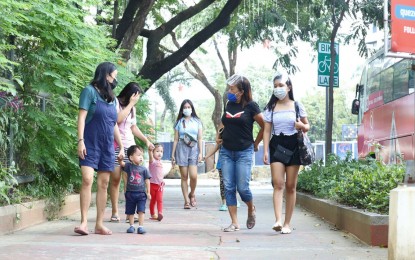
(File photo)
MANILA – Metro Manila, along with 47 other areas in several parts of the country, will remain under Alert Level 1 until March 31, Malacañang said on Tuesday.
This, after the Inter-Agency Task Force for the Management of Emerging Infectious Diseases (IATF-EID) approved the new alert level classifications in the country, acting Presidential Spokesperson and Communications Secretary Martin Andanar said in a press statement.
“The Inter-Agency Task Force on Tuesday, March 15, 2022, placed the National Capital Region, along with 47 other areas, under Alert Level 1, effective March 16, 2022 until March 31, 2022,” Andanar said.
Only Metro Manila and 39 other areas have been placed under the most lenient Alert Level 1 for the first half of March.
The provinces of Nueva Ecija, Zambales, and Batangas, as well as the cities of Lucena, Cebu, Ormoc, Tacloban, and Butuan have been added to the roster of places in the country where Alert Level 1 will be implemented from March 16 to 31, Andanar said.
In Luzon, Abra, Apayao, Baguio City, Kalinga, Dagupan City, Ilocos Norte, Ilocos Sur, La Union, Pangasinan, Batanes, Cagayan, City of Santiago, Isabela, Quirino Angeles City, Aurora, Bataan, Bulacan, Olongapo City, Pampanga, Tarlac, Cavite, Laguna, Marinduque, Puerto Princesa City, Romblon, Naga City and Catanduanes will stay under Alert Level 1.
For the Visayas, Aklan, Bacolod City, Capiz, Guimaras, Iloilo City, Siquijor, and Biliran will remain under Alert Level 1.
Alert Level 1 in Zamboanga City, Cagayan de Oro City, Camiguin, and Davao City will continue until the end of March.
Andanar said the rest of the country will remain under Alert Level 2.
“The areas not in the abovementioned list shall be under Alert Level 2 beginning March 16, 2022 until March 31, 2022,” he said.
Under Alert Level 1, movement of persons regardless of age and comorbidities is allowed, but with restrictions on crowded and closed spaces and close contact (3Cs) settings.
The operations of private establishments and government agencies are likewise allowed at full on-site capacity, subject to minimum public health standards.
The IATF-EID is also still requiring the wearing of well-fitted face masks, except when eating and drinking; participating in team and individual sports in venues where ventilation standards can be maintained; and practicing outdoor sports or exercise activities where physical distance can still be observed.
People aged 18 and above must present proof of full vaccination before participating in mass gatherings or entry into indoor establishments like churches, restaurants, fitness studios and gyms, indoor cinemas, meetings and exhibition venues, wedding receptions, birthday parties, hotels and other accommodation establishments, and venues for election-related events.
Proof of full vaccination is also required for those aged at least 18 years before entry in confined spaces with poor ventilation; crowded places with no physical distancing; and close-contact settings with face-to-face interaction. (PNA)
